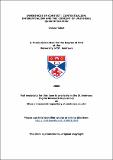Files in this item
Inferences in context : contextualism, inferentialism and the concept of universal quantification
Item metadata
| dc.contributor.advisor | Wright, Crispin | |
| dc.contributor.author | Tabet, Chiara | |
| dc.coverage.spatial | 286 | en |
| dc.date.accessioned | 2009-05-15T13:01:44Z | |
| dc.date.available | 2009-05-15T13:01:44Z | |
| dc.date.issued | 2008-11-27 | |
| dc.identifier.uri | https://hdl.handle.net/10023/688 | |
| dc.description.abstract | This Thesis addresses issues that lie at the intersection of two broad philosophical projects: inferentialism and contextualism. It discusses and defends an account of the logical concepts based on the following two ideas: 1) that the logical concepts are constituted by our canonical inferential usages of them; 2) that to grasp, or possess, a logical concept is to undertake an inferential commitment to the canonical consequences of the concept when deploying it in a linguistic practice. The account focuses on the concept of universal quantification, with respect to which it also defends the view that linguistic context contributes to an interpretation of instances of the concept by determining the scope of our commitments to the canonical consequences of the quantifier. The model that I offer for the concept of universal quantification relies on, and develops, three main ideas: 1) our understanding of the concept’s inferential role is one according to which the concept expresses full inferential generality; 2) what I refer to as the ‘domain model’ (the view that the universal quantifier always ranges over a domain of quantification, and that the specification of such a domain contributes to determine the proposition expressed by sentences in which the quantifier figures) is subject to a series of crucial difficulties, and should be abandoned; 3) we should regard the undertaking of an inferential commitment to the canonical consequences of the universal quantifier as a stable and objective presupposition of a universally quantified sentence expressing a determinate proposition in context. In the last chapter of the Thesis I sketch a proposal about how contextual quantifier restrictions should be understood, and articulate the main challenges that a commitment-theoretic story about the context-sensitivity of the universal quantifier faces. | en |
| dc.format.extent | 2727117 bytes | |
| dc.format.mimetype | application/pdf | |
| dc.language.iso | en | en |
| dc.publisher | University of St Andrews | |
| dc.subject | Universal quantification | en |
| dc.subject | Context-sensitivity | en |
| dc.subject | Inference | en |
| dc.subject.lcc | BC199.I47T2 | |
| dc.subject.lcsh | Inference | en_US |
| dc.subject.lcsh | Contextualism (Philosophy) | en_US |
| dc.subject.lcsh | Grammar, Comparative and general--Quantifiers | en_US |
| dc.title | Inferences in context : contextualism, inferentialism and the concept of universal quantification | en |
| dc.type | Thesis | en |
| dc.type.qualificationlevel | Doctoral | en |
| dc.type.qualificationname | PhD Doctor of Philosophy | en |
| dc.publisher.institution | The University of St Andrews | en |
This item appears in the following Collection(s)
Items in the St Andrews Research Repository are protected by copyright, with all rights reserved, unless otherwise indicated.

